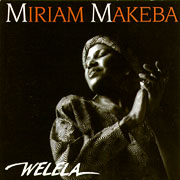
Welela
Miriam Makeba
1989: Mercury 838 208-2
I have this because my friend Rob had a copy shortly after it came out and I found it quite engaging; how Rob happened to have come by it I do not know offhand and still scratch my head about, as it’s not the sort of thing I normally would associate with a big 7DA-raised white guy from New Mexico.
Regardless of its provenance at our level and how it came into our music libraries, I at least already knew about Makeba somewhat, having grown up an avid fan of Belafonte Returns to Carnegie Hall and her excellent performances thereon (including the delicately hilarious “One More Dance” duet with Harry Belafonte). I didn’t come to learn about the extent of her personal and sociopolitical drama until much later, and even that yielded more developments over time (and thankfully included her return to South Africa in 1990, in turn after her glorious and moving performance in Paul Simon’s Graceland concert in Harare as documented in the 1987 concert film), but there was no question as to the weight of what she was addressing in the song “Soweto Blues” here (written by her former husband Hugh Masekela). Other tracks are evidently about South Africa and apartheid, but as they’re not in English I can only surmise that.
Eleven or so years after getting this album, I was curious and pleased to hear Zap Mama’s version of “African Sunset” playing at the internet café Le Web Bar, in Paris, in 1998. I haven’t quite determined why the latter version credits Alpheus Mnyandu as its writer, whereas this album credits Sipho Mabuse, but either way I do love its slightly dark sway. The vocal chordings of “Soweto Blues” move me more, though, and now even more so having had the more emotional combined performance of Makeba and Masekela at the Harare concert.
Not all the tracks on this grab me, but if I knew what the lyrics were saying I would probably hold the whole in higher regard. Without that knowledge, some of the tracks just sound pleasant but might well be telling of more serious things that would qualify and deepen the listening experience.
In any case, I just love to hear Makeba sing. Her voice is so distinctively hers and always simultaneously arrests and charms me.
Comments © 2019 Mark Ellis Walker, except as noted, and no claim is made to the images and quoted lyrics.